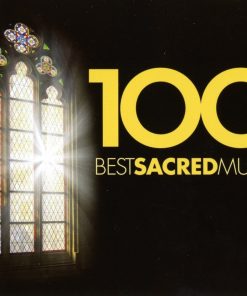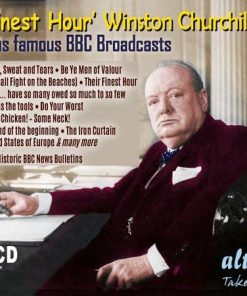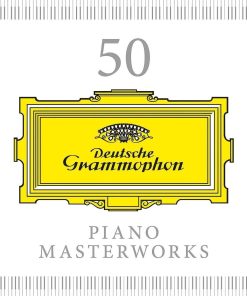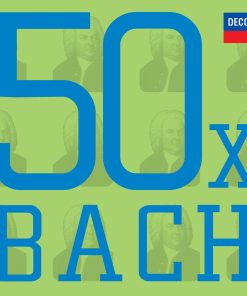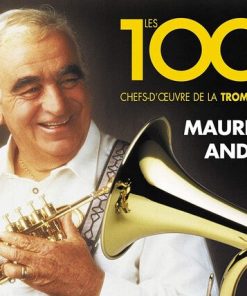KARL MUNCHINGER: THE CLASSICAL LEGACY (8 CDS) DECCA
$ 55,99 $ 28,00

A feast of Haydn and Mozart under the sure and stylish baton of Karl Münchinger, including several recordings making their first international appearance on CD.
This box of Münchinger’s legacy in Classical-era repertoire picks up where the Eloquence set of his Baroque recordings (484 0160) left off, with six symphonies of Haydn. He had founded the Stuttgart Chamber Orchestra in 1946, and Decca began making records with them three years later. The excellence and commercial success of these albums caused the label to invite him to work with orchestras other than his own, in Paris (the Conservatoire Orchestra) and, more prestigiously still, the Vienna Philharmonic.
The first fruits of this new relationship were issued in May 1955: an LP of No.88 and No.101, the ‘Clock’. Reviewers looked to the likes of Furtwangler and Toscanini for comparison respectively, and did not find Münchinger wanting for either grandeur or pathos in this music. The sequels took in Nos 96 and 104 (recorded in May 1957) and Nos. 83 and 100 (from April 1961): superbly open and spacious Sofiensaal recordings engineered in classic Decca sound by John Culshaw and Christopher Raeburn.
By then Münchinger was also recording Mozart for Decca, both with an enlarged cohort of his Stuttgart ensemble and with the Vienna Philharmonic. The repertoire included not only mature symphonies but also concertos (with the Viennese principals Werner Tripp and Alfred Prinz on flute and clarinet respectively), serenades (featuring the inimitably luscious tone of Willi Boskovsky’s violin) and rarities such as the ballet Les Petits Riens, recorded back in Stuttgart.
The set concludes with two discs of concertos: Haydn and Boccherini with the cellist Pierre Fournier, Mozart with both Christian Ferras – including the apocryphal ‘Adelaide’ concerto once championed by Menuhin – and Wilhelm Kempff, in a pairing of the Piano Concertos Nos. 9 and 15 that had critics reaching for superlatives in an era when these works had barely entered the record catalogues.

‘I call attention to Kempff’s exquisite artistry in the variations of the Andante [of Piano Concerto No.15]… One also notes here the extraordinary independent life which the bass line has in Kempff’s performance; left and right hand seem to be two different instruments.’ Gramophone, September 1954 ‘Finally an edition appears which expresses entirely what we have been imagining inwardly what the music must truly be… Lovers of Concertos 9 and 15 are warned that a hearing of [the Kempff/Münchinger recording] will infallibly involve the purse.’ High Fidelity, December 1954
‘[Mozart’s Symphony] No.33 enjoys reproduction of exceptional appeal… We are treated to a refreshing balm without damage to unity and decision in a positive and graceful performance. This is easily the best recording.’ High Fidelity, June 1956 ‘His performances of [Nos. 96 and 104] are first-rate and stunningly recorded. Who said that Haydn doesn’t blossom in stereo?’ High Fidelity, October 1959
‘A wholly delightful performance of a delectable Haydn work [Symphony No.83]. It’s not to be missed.’ High Fidelity, October 1962 (Haydn, Symphony No.83)
‘This is without doubt the recommended coupling of the two concertos… The whole [Clarinet Concerto] from Prinz, Munchinger and the mellow Vienna orchestra has a wonderful feeling of maturity. No one tries any effects, nor takes other than leisurely speeds, for they know that this is superb music and only needs to be played with such artistry never to fall into dullness.’ Gramophone, January 1964 (Mozart, Concertos for Clarinet and for Flute & Harp)


CD 1
FRANZ JOSEPH HAYDN (1732–1809)
Symphony No. 88 in G major, Hob.I:88
Symphony No. 101 in D major, Hob.I:101 ‘Clock’
Symphony No. 96 in D major, Hob.I:96 ‘Miracle’*
Wiener Philharmoniker
*FIRST INTERNATIONAL CD RELEASE ON DECCA
CD 2 Symphony No. 104 in D major, Hob.I:104 ‘London’°
Symphony No. 83 in G minor, Hob.I:83 ‘La Poule’*
Symphony No. 100 in G major, Hob.I:100 ‘Military’*
Wiener Philharmoniker
°FIRST INTERNATIONAL CD RELEASE ON DECCA
*FIRST CD RELEASE ON DECCA
CD 3 WOLFGANG AMADEUS MOZART (1756–1791)
Symphony No. 31 in D major, KV 297 ‘Paris’*
Symphony No. 32 in G major, KV 318 (Overture in G major)*
Symphony No. 35 in D major, KV 385 ‘Haffner’*
Stuttgart Klassische Philharmonie
Symphony No. 40 in G minor, KV 550°
Wiener Philharmoniker
*FIRST INTERNATIONAL CD RELEASE ON DECCA
CD 4
Symphony No. 33 in B flat major, KV 319*
Concerto for Flute, Harp and Orchestra in C major, KV 299
Werner Tripp, flute
Hubert Jellinek, harp
Clarinet Concerto in A major, KV 622
Alfred Prinz, clarinet
Wiener Philharmoniker
*FIRST CD RELEASE ON DECCA
CD 5
Serenade in D major, KV 250 ‘Haffner’
Willi Boskovsky, violin
Wiener Philharmoniker
Serenade in G major, KV 525 ‘Eine kleine Nachtmusik’*
Stuttgarter Kammerorchester
*FIRST CD RELEASE ON DECCA
CD 6
Divertimento No. 1 in D major, KV 136*
Divertimento No. 11 in D major, KV 251 ‘Nannerl-Septett’*
Les Petits Riens, K.app.10 (Ballet)*
Ein musikalischer Spass, KV 522*
Stuttgarter Kammerorchester
*FIRST INTERNATIONAL CD RELEASE ON DECCA
CD 7
FRANZ JOSEPH HAYDN (1732–1809)
Cello Concerto No. 2 in D major, Hob.VIIb:2
Pierre Fournier, cello
Stuttgarter Kammerorchester
WOLFGANG AMADEUS MOZART (1756–1791)
Violin Concerto No. 3 in G major, KV 216
attrib. WOLFGANG AMADEUS MOZART (1756–1791)
Violin Concerto No. 6 in E flat major, KV 268 / 356b / Anh.C. 14.04
Christian Ferras, violin
Stuttgarter Kammerorchester
CD 8
LUIGI BOCCHERINI (1743–1805)
Cello Concerto in B flat major, G. 482
Arranged by Friedrich Grützmacher (1832–1903)
Pierre Fournier, cello
Stuttgarter Kammerorchester
WOLFGANG AMADEUS MOZART (1756–1791)
Piano Concerto No. 9 in E flat major, KV 271 ‘Jeunehomme’
Piano Concerto No. 15 in B flat major, KV 450
Wilhelm Kempff, piano
Stuttgarter Kammerorchester
Members of L’Orchestre de la Suisse Romande
KARL MÜNCHINGER
Fast Shipping and Professional Packing
Due to our longstanding partnership with UPS FedEx DHL and other leading international carriers, we are able to provide a range of shipping options. Our warehouse staff are highly trained to pack your goods exactly according to the specifications that we supply. Your goods will undergo a thorough examination and will be safely packaged prior to being sent out. Everyday we deliver hundreds of packages to our customers from all over the world. This is an indication of our dedication to being the largest online retailer worldwide. Warehouses and distribution centers can be located in Europe as well as the USA.
Orders with more than 1 item are assigned processing periods for each item.
Before shipment, all ordered products will be thoroughly inspected. Today, most orders will be shipped within 48 hours. The estimated delivery time is between 3-7 days.
Returns
The stock is constantly changing. It's not entirely managed by us since we are involved with multiple parties such as the factory and our storage. The actual stock can fluctuate at any time. Please understand it may happen that your order will be out of stock when the order is placed.
Our policy is valid for 30 days. If you haven't received your product within 30 days, we're not able to issue either a return or exchange.
You are able to return a product if it is unused and in the same condition when you received it. It must also still remain in the original packaging.








